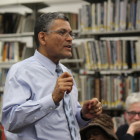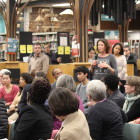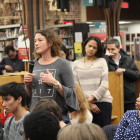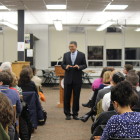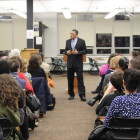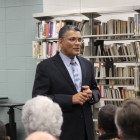New Superintendent of Schools Dr. John J. Ramos Sr. appeared to hit all the right notes in his first public introduction to the South Orange-Maplewood School District community on Tuesday night, April 7.
During a 90-minute event at the Columbia High School library, which included an introduction by Board of Education President Wayne Eastman, a 20-minute talk by Ramos, and a question-and-answer segment with the audience, Ramos exhibited charm, humor, some strong opinions, and a stated desire to listen and collaborate. He also did his homework, showing that he was aware of major issues facing the district as well as reaction to his hiring as discussed on social media and Maplewoodonline.com.
Accompanying Ramos was his wife of 42 years, Jacqueline, who periodically interrupted him to appreciative laughter from the audience.
But while many audience members were supportive — with some actually pledging their support and offering their services — others were reserving judgment until Ramos got on the job. Although he will be visiting the schools tomorrow and will continue meeting with stakeholders including teachers, Ramos’ official start date is August 1.
During his introductory remarks, Ramos quickly addressed the issue of his termination from the Bridgeport, CT school district in 2011. Ramos noted that the average tenure for urban school superintendents is 2-1/2 years, while he held the position in Bridgeport for 6-1/2 years. He also said that his experience in Bridgeport “leaves me in a better position to serve you.” Later Ramos said that one of the toughest situations he ever faced was telling the board of education in Bridgeport that it should not pass a budget in which $60 million in cuts had been made. He said that bringing in the state to take over the district was basically “falling on my sword.”
One Marshall parent, who said she was interested in saving world languages in the elementary schools, asked Ramos, “Do we have a voice?” His response was that he wanted to create a single repository for all communications including phone calls, tweets, and Facebook posts. “An organized way to hear you,” said Ramos. But Ramos noted that he did not want to get ahead of his board and that considerations like budget could impact the particular, unnamed idea that he was interested in implementing. The questioner seemed not completely satisfied with the response saying she looked “forward to hearing your secret plan.”
Ramos stated his belief in shared decision making and discussed his “non-negotiables” — servant leadership and the belief that excellence and equity go “hand in hand” (see the video clip above).
Ramos also referenced an information-gathering tool called kiva several times. He said that he had used this tool while working in South Africa post-apartheid to combine five segregated school districts into one. Ramos explained that kiva, which he said is a concept from Southwestern Native American culture, is a highly organized and regimented meeting structure in which circles of participants answer questions in limited time frames and then feedback is elicited from other circles. Ramos said that kiva was a means to collect a “great deal of data in a short time.” He noted that one of this first tasks would be listening as he met with all stakeholders throughout the district.
Despite all the listening, Ramos repeatedly reminded the audience that the challenges facing the district are shared challenges.
When asked about the difficulty of making programming and budget cuts, Ramos said, “It’s not my problem, it’s our problem. It’s easier to stand back and throw darts when the decision are made.” He added, “I’ve been a pin cushion too long.” He promised to get parents the information they needed to be involved in the process. However, he said he knew that some decisions would come down to him ultimately and “not everyone is going to be happy. ”
“Every time a superintendent makes a decision, he makes an enemy,” said Ramos. “And then the enemies find each other.” This elicited laughter from the audience.
Regarding a question about special education, Ramos said he “broadly” supported “the least restrictive environment” for students with special needs but that it depended on the situation. Ramos talked about the need for trust between parents, teachers and administrators. He talked about seeing students suffer when parents lobbied successfully to have them placed in the wrong situations. Ramos said that special education issues were “full of emotion” and “real personal” (he noted that his son is dyslexic and has ADHD). He cautioned, “before anything we have to be human and engage each other at that level.”
Regarding PARCC and testing, Ramos said, “I have a problem with standardized tests.” Although he said that such tests “have some value … as a country, we’ve become obsessed with testing.” He added, “An elephant doesn’t change its weight if you weigh it every day.” Ramos said he worried about “teaching to the test” and said he preferred that the district “teach quality and let the tests take care of themselves.” This remark received loud applause.
A final question was about de-leveling and AP classes. Ramos was judicious in his comments saying, “I don’t see any elimination of AP classes. I do foresee trying to figure out ways for students to access AP who currently do not not have that opportunity.” He referenced his experience at Norwalk High School where he said that students at the lowest levels were almost exclusively minority students and where students in the highest level classes were almost exclusively white. He said that he created “grade 19,” a concept based on Ted Sizer’s Essential Schools where supports were built in to shrink the inequity but also avoid teaching “down.”
“Is there any place for leveling?” Ramos asked rhetorically. “Differentiated instruction is supposed to be an answer if done right,” but he noted that with 28-30 kids in a class, it’s “very, very hard to do and then you put 3 or 4 inclusion kids in —that’s a lot going on!”
But he cautioned the audience: “Don’t leave the room saying, ‘Oh that’s it, he’s blowing up the district!’ I’m not saying that.” Ramos did say that if the district truly values diversity then it must find ways to provide equity “but not dampen any student’s growth.”
Afterward, parent reaction was positive. One parent said, “I think he’s going to be good for this community.”
Another said, “I was a little worried by early Maplewoodonline stuff, but I think he has assuaged my fears with his experience, long history, perspective, the wisdom of age. Bridgeport sounds like he really did throw himself on his sword.” The parent continued, “He addressed everything. Maybe he’ll make enemies and maybe he’ll see us through. I’m cautiously optimistic and more encouraged by what I heard tonight.”
Click on any image below to view a slideshow of photos from the event.

